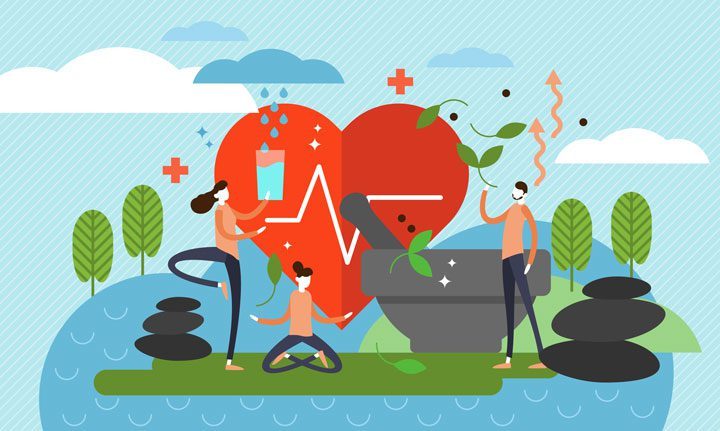
When medical professionals talk about mind-body wellness, what does this actually mean? It’s an acknowledgment of the connection between all aspects of self: our physical well-being, our mental and emotional health, and even our spiritual center, or soulful intent.
Whole-Person Wellness
Without question, medical applications are necessary for progressive health. After all, if you break your leg, positive thoughts aren’t enough to properly set the bone and help it fuse together. But your attitude about the incident, how you handle diet and mobility, what techniques you use for pain management and other options are considered alternative or holistic practices. Medical and holistic integration is considered whole-person wellness. This connection is essential for true healing.
To help someone recover from substance use disorder, process disorders, trauma, or grief, holistic treatments provide ready tools for managing individual well-being. Alternative methods are frequently successful with mood disorders and co-occurring disorders as well, because an individual learns the value of self-awareness, grounding, and stress reduction.
Holistic Treatments Used for Recovery
Many holistic approaches aren’t complicated at all. Once you’ve learned them, it’s simply a matter of remembering how they help you and turning to them to find a calm center. Other holistic treatments are administered by professionals on a regular basis to help you attain a certain level of release, address key trauma issues, or provide another layer of care specific to your circumstances.
Individual Holistic Care
- Relaxation activities such as yoga, meditation, massage, reiki, mindfulness, tai-chi, and passive muscle relaxation all reduce the “fight or flight” response, improve circulation, provide deeper relaxation, and boost endorphins, the natural “feel-good” brain chemicals.
- Consistent exercise is a guaranteed way to help your mental and emotional processing and keep your body healthy, especially when you spend time outdoors.
- Breathing techniques, like these suggested by Andrew Weil, founder of the Center for Integrative Medicine at the University of Arizona, help reduce anxiety, create a center of focus, and calm the nervous system.
- While not everyone has a Mary Sunshine disposition, we’re all able to practice gratitude, and that has a positive impact on our well-being. Try this gratitude quiz from the Greater Good Science Center to learn more about how gratitude helps you develop a better outlook on life.
- A major holistic tool for better recovery is to understand your stressors so you don’t fall back on compulsive behaviors or substance use.
- Choose a whole-foods diet and avoid fried or fast food and processed meals, as better nutrition provides essential vitamins and minerals that feed both the body and brain.
- Learn to create firm but compassionate boundaries so your coping skills enable you to not be drawn into old dramas.
- Develop better sleep habits, as our minds and bodies go through a lot of repair during proper rest.
Professional Holistic Care
- Eye Movement Desensitization and Reprocessing (EMDR) is a therapeutic method especially helpful for people recovering from PTSD, trauma, and grief. A trained EMDR specialist guides a person through a series of exercises designed to change the way a person experiences a traumatic memory. Exercises include eye movements, tapping, or the use of tones.
- Somatic experiencing helps individuals release learned reactions to trauma and suppressed emotions so they don’t fall into the same patterns of avoidance or self-destructive behaviors. Over a period of sessions with a trained professional, they acquire new skills to regulate stress responses and develop a better tolerance to certain triggers.
- Alternative pain management methods, such as acupuncture, biofeedback, cryotherapy, myofascial release therapy, and nerve blocking help not only with consistent pain, but also with abatement. These and similar techniques are especially helpful for people who once had chronic injury issues they tried to alleviate with prescription drugs, individuals who experience depression related to persistent pain, or others who have addiction-related aches and complications.
We Specialize in Whole-Person Wellness
We understand the interconnected layers between conditions such as substance use disorders, trauma and PTSD, co-occurring disorders, eating disorders, grief, substance detox, process disorders, and mood disorders.
With the insight of comprehensive, unified, whole-body assessments, the interdisciplinary professionals at Cottonwood Tucson offer a wide range of treatment solutions including:
- Pharmacologic testing
- EMDR
- Nutraceutical
- Acupuncture
- Somatic experiencing
- Medication-assisted therapies
- Imaging
From equine therapy and yoga to spiritual support and expressive arts groups, Cottonwood’s holistic approach offers our patients the opportunity to become the creators of their health and wellness through skillful attention to the nourishment of a balanced lifestyle. Talk with a member of our admissions team today to learn how we can help you.







